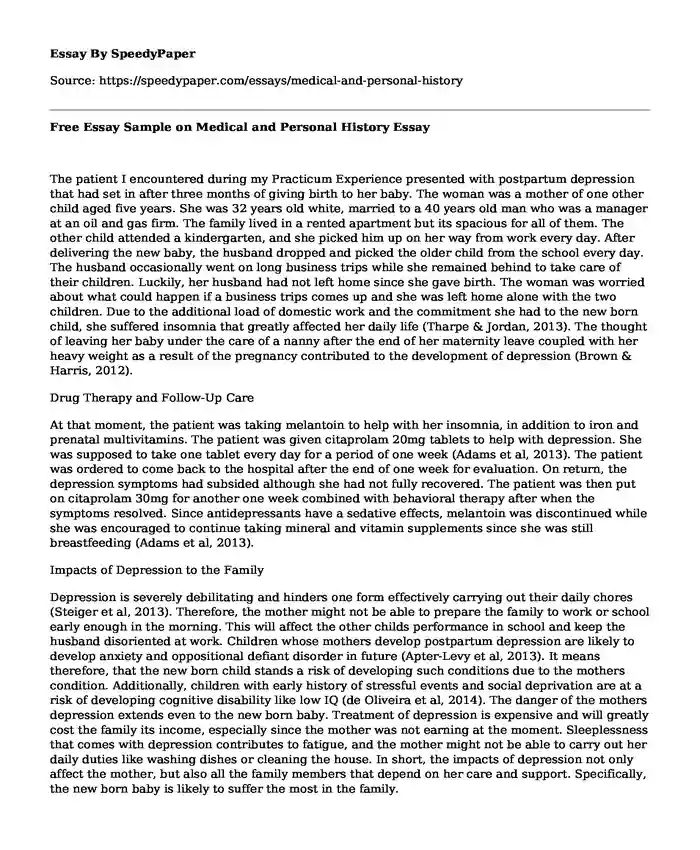
| Type of paper: | Essay |
| Categories: | Psychology Mental health Depression |
| Pages: | 3 |
| Wordcount: | 769 words |
The patient I encountered during my Practicum Experience presented with postpartum depression that had set in after three months of giving birth to her baby. The woman was a mother of one other child aged five years. She was 32 years old white, married to a 40 years old man who was a manager at an oil and gas firm. The family lived in a rented apartment but its spacious for all of them. The other child attended a kindergarten, and she picked him up on her way from work every day. After delivering the new baby, the husband dropped and picked the older child from the school every day. The husband occasionally went on long business trips while she remained behind to take care of their children. Luckily, her husband had not left home since she gave birth. The woman was worried about what could happen if a business trips comes up and she was left home alone with the two children. Due to the additional load of domestic work and the commitment she had to the new born child, she suffered insomnia that greatly affected her daily life (Tharpe & Jordan, 2013). The thought of leaving her baby under the care of a nanny after the end of her maternity leave coupled with her heavy weight as a result of the pregnancy contributed to the development of depression (Brown & Harris, 2012).
Drug Therapy and Follow-Up Care
At that moment, the patient was taking melantoin to help with her insomnia, in addition to iron and prenatal multivitamins. The patient was given citaprolam 20mg tablets to help with depression. She was supposed to take one tablet every day for a period of one week (Adams et al, 2013). The patient was ordered to come back to the hospital after the end of one week for evaluation. On return, the depression symptoms had subsided although she had not fully recovered. The patient was then put on citaprolam 30mg for another one week combined with behavioral therapy after when the symptoms resolved. Since antidepressants have a sedative effects, melantoin was discontinued while she was encouraged to continue taking mineral and vitamin supplements since she was still breastfeeding (Adams et al, 2013).
Impacts of Depression to the Family
Depression is severely debilitating and hinders one form effectively carrying out their daily chores (Steiger et al, 2013). Therefore, the mother might not be able to prepare the family to work or school early enough in the morning. This will affect the other childs performance in school and keep the husband disoriented at work. Children whose mothers develop postpartum depression are likely to develop anxiety and oppositional defiant disorder in future (Apter-Levy et al, 2013). It means therefore, that the new born child stands a risk of developing such conditions due to the mothers condition. Additionally, children with early history of stressful events and social deprivation are at a risk of developing cognitive disability like low IQ (de Oliveira et al, 2014). The danger of the mothers depression extends even to the new born baby. Treatment of depression is expensive and will greatly cost the family its income, especially since the mother was not earning at the moment. Sleeplessness that comes with depression contributes to fatigue, and the mother might not be able to carry out her daily duties like washing dishes or cleaning the house. In short, the impacts of depression not only affect the mother, but also all the family members that depend on her care and support. Specifically, the new born baby is likely to suffer the most in the family.
References
Adams, M. P., Holland, N., & Carol Urban PhD, R. N. (2013). Pharmacology for nurses: A pathophysiologic approach. Pearson Higher Ed.
Apter-Levy, Y., Feldman, M., Vakart, A., Ebstein, R. P., & Feldman, R. (2013). Impact of maternal depression across the first 6 years of life on the childs mental health, social engagement, and empathy: the moderating role of oxytocin. American Journal of Psychiatry.
Brown, G. W., & Harris, T. (Eds.). (2012). Social origins of depression: A study of psychiatric disorder in women. Routledge.
de Oliveira, P. A., Moreira, C. F., Scivoletto, S., de Almeida Rocca, C. C., Fuentes, D., & Cunha, P. J. (2014). Intellectual disability and psychiatric diagnoses of children and adolescents with a history of stressful events and social deprivation in Brazil: preliminary results. IQ, depression and stress.
Journal of Intellectual Disability-Diagnosis and Treatment, 2(1), 42-45.
Steiger, A., Dresler, M., Kluge, M., & Schussler, P. (2013). Pathology of sleep, hormones and depression. Pharmacopsychiatry, 46(S 01), S30-S35.
Tharpe, N. L., Farley, C., & Jordan, R. G. (2013). Clinical practice guidelines for midwifery & Womens health (4th ed.). Burlington, MA: Jones & Bartlett Publishers.
Cite this page
Free Essay Sample on Medical and Personal History. (2019, Nov 07). Retrieved from https://speedypaper.com/essays/medical-and-personal-history
Request Removal
If you are the original author of this essay and no longer wish to have it published on the SpeedyPaper website, please click below to request its removal:
- Movie Essay Sample on Cave of Forgotten Dreams: Chauvet Cave as the Home of Homo Spiritualis
- Essay Sample Dedicated to the Impact of Climate Change on the Ozone Hole
- Essay example on Gun Violence in the United States of America
- Annotated Outline and Annotated Bibliography
- Essay Sample: Perceptual and Cognitive Bias in Intelligence Analysis and Decision-Making
- Research Paper on Understanding the Beatles and Coldplay and Their Music
- Dietary Fiber Intake & Prevention of Chronic Diseases - Essay Sample
Popular categories




